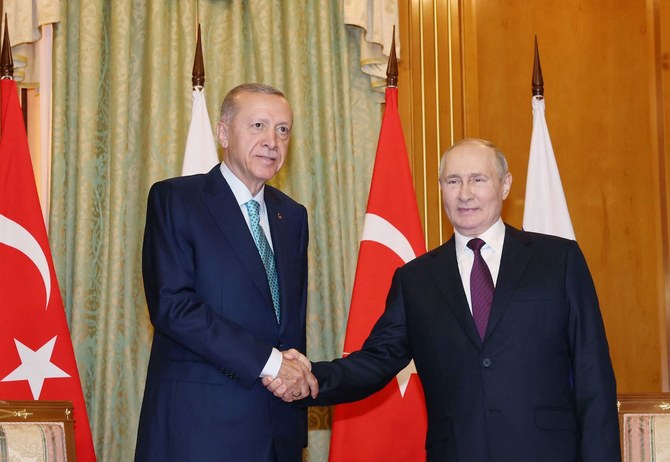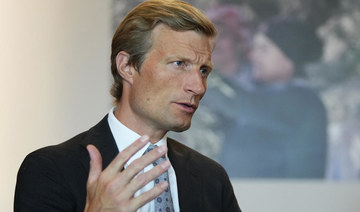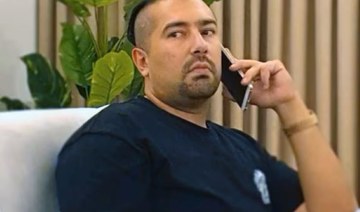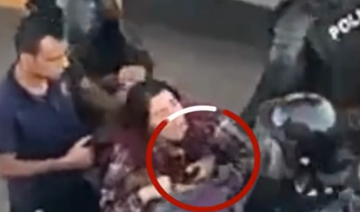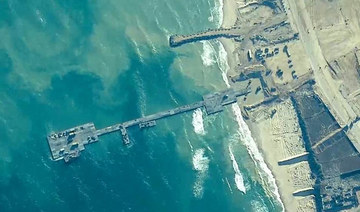ANKARA: Russian President Vladimir Putin and his Turkish counterpart Recep Tayyip Erdogan convened in the picturesque Black Sea resort of Sochi on Monday evening, reigniting hopes of resurrecting the Ukraine grain export deal.
But experts say that more Western engagement is needed to revive the deal, while Turkiye will continue enshrining its role as a facilitator to communicate Russian demands to its partners in the West and to convince the Kremlin to stick with the deal.
The agreement, previously brokered by the UN and Turkiye a year ago, has been in limbo after Russia quit the deal in July, and the talks aimed at its revival yielded mixed results.
Despite the anticipation surrounding the meeting, no breakthrough agreement appeared to be on the horizon. Russia’s willingness to return to the grain deal was contingent on the Western nations lifting restrictions imposed on Russian products, a stipulation that poses a substantial hurdle to progress.
During their Sochi tete-a-tete, Putin expressed his willingness to re-engage with the grain deal once the sanctions on Russian goods were lifted.
Additionally, he proposed an alternative scheme, involving the dispatch of 1 million tons of grain to Turkiye, with the intention of having it processed and subsequently transferred to six African countries.
The implementation of this proposal would be facilitated by financial support from Qatar to avert an impending food crisis in those regions.
However, this alternative plan does not replace the resumption of grain shipments from Ukraine given that the related quantities are much smaller.
According to data sourced from the Joint Coordination Center in Istanbul, a significant 57 percent of Ukraine’s grain exports were destined for developing nations, with China being a prominent recipient.
Erdogan’s stance on the matter has been consistent: he seeks to broker a resolution that would allow Ukraine to safely export its grain and secure global food supplies.
Meanwhile, the relationship between Turkiye and Russia continues to deepen, with bilateral trade reaching an impressive $69 billion last year.
Turkiye, a NATO member, has notably refrained from participating in Western sanctions against Russia following its invasion of Ukraine. Simultaneously, Turkiye has been providing support to Ukraine, including sending arms and endorsing Kyiv’s aspirations to join NATO.
According to Sinan Ulgen, a former Turkish diplomat and chairman of the Istanbul-based think tank EDAM, Turkiye is continuing to play a role of facilitator regarding the grain deal, but it seems that the position has been quite clear that demands tabled by Russia will ultimately necessitate action by Western countries.
“In that sense, Turkiye has no real ability to fulfill Russia’s demands. What Turkiye can do at best is to listen to Russia’s concerns and to communicate them clearly to its partners in the West,” he told Arab News.
Ulgen thinks that there are limits to what Turkiye can deliver via this high-level political dialogue with Putin.
“After the meeting, we haven’t really seen any scope for fast progress on the revitalization of the deal, given that Russia’s formulated demands were more or less the same as those it has expressed in the past and (which have) not been fulfilled by the Western states,” he said.
UN Secretary-General Antonio Guterres recently dispatched a letter to Russian Foreign Minister Sergey Lavrov, outlining “concrete proposals” aimed at reviving the grain deal. However, these proposals did not meet Russian expectations.
Turkish Foreign Minister Hakan Fidan recently met Lavrov in Russia regarding the grain deal, and said it was a “process that tries to better understand Russia’s position and requests, and to meet them.”
Ulgen said: “For Turkiye, there is a degree of diplomatic prestige of trying to be a facilitator of the deal, not only internationally but also multilaterally, especially vis-a-vis the United Nations’ secretary-general. This is the main motivation for Turkiye wanting to continue to operate as a facilitator for the deal itself.”
During the joint press conference with Putin on Monday evening, Erdogan said Turkiye arranged a new package of proposals to address Russia’s complaints, and it expects that it would resolve the ongoing Black Sea grain deal crisis.
Erdogan also urged Ukraine to soften its approach to ensure Russia’s return to the grain deal.
According to Ulgen, the statement about Ukraine should not be read as a strategic change in Turkiye’s position, but as part of Erdogan’s balancing act.
He said: “Turkiye does not want to burn in any way its prospect of outreach and dialogue with neither Russia or Ukraine.”
Prof. Emre Ersen, an expert on Turkiye-Russia relations from Marmara University in Istanbul, thinks that it will be very difficult for Erdogan to convince Putin to return to the grain deal under current conditions, since the West is currently not ready to take steps that would fully satisfy Moscow regarding this issue, for instance in terms of easing the sanctions regarding the SWIFT system.
“Nevertheless, it should be noted that Erdogan is one of the few leaders in NATO who can still talk to Putin which means that there is room for progress,” he told Arab News.
For Russia expert Prof. Mitat Celikpala, from Kadir Has University in Istanbul, the prospects for a swift resolution in the grain deal negotiations between Turkiye and Russia appear poor.
“Erdogan’s handling of the grain deal negotiations has not only solidified Turkiye’s international reputation but has also paved the way for further diplomatic endeavors," he told Arab News.
“Currently, Ankara is actively engaged in efforts to extend the proposals initially set forth by the United Nations to the Kremlin in Russia.
“This ambitious endeavor seeks to resurrect the stalled grain deal, which holds considerable economic and humanitarian significance.”
Celikpala, however, cautioned: “Yet, as Ankara pushes forward in its diplomatic pursuits, it is acutely aware of the delicate balancing act it must perform.
"Turkiye recognizes that, despite its earnest intentions, it cannot unilaterally steer the entire negotiation process without aligning itself with its Western partners.”
Beyond the confines of Turkiye’s diplomacy, the US is also making strategic moves to influence the situation. Collaborating with Romania and Moldova, the US is actively exploring alternative export routes to expand Ukraine’s grain exports via the Danube River.
“That route is likely to be completed shortly, which will increase Western leverage on Russia,” Celikpala noted.
“Ankara tries to implement a project where there will be two supply channels, one from Ukraine and the other one from Russia, which will make Turkiye a hub for grain processing and exports.
“It is not realistic for Western countries to bolster the Kremlin’s hand and increase its economic clout against Ukraine by expanding trade potential.”
In addition to these challenges, Celikpala highlighted the complexities surrounding the possibility of Kyiv exporting its products via ships in the Black Sea, under Turkiye’s monitoring as a littoral country. Such a scenario could, in his view, inadvertently thrust Ankara into a direct clash with Russia.
“Considering the expectations of all relevant parties, it is unlikely that the grain deal will resume soon, but it will act as a carrot to gather the West, Turkiye, and Russia regularly,” Celikpala said.



